Since she started attending church with the Episcopalians, I’ve heard my sister Lynnette observe that members of her new church appear to have a much broader range of beliefs than Mormons do. I guess I had never really thought about this, but if it’s true, this seems like maybe it shouldn’t be too surprising. There is lots of pressure to conform in Mormonism, all the way from scriptures that have Jesus saying “I say unto you, be one; and if ye are not one ye are not mine” to talks that exhort members to set aside the cultures they grew up in to join “the gospel culture.” And of course, this doesn’t even touch on the pressure at the local level to conform. Consider, for example, the immense backlash faced by women who participated in the “wear pants to church” actions a few years ago. They were not even going against a rule of any kind, but rather violating a norm and standing out, and this made a lot of rank-and-file members appear to lose their minds. I don’t have a very good sense of the Episcopal Church in general, but I’m guessing that, like many American Protestants, they are simply less top-down in their structure than Mormons are, so there’s more room for differences of opinion or even belief.
Really, though, what I thought would be even more interesting than reasoning out why or why not Mormons might be more homogeneous in belief than members of other churches, would be to see if there were any empirical evidence of this difference. It occurred to me that a great place to look would be the data gathered by the Pew Research Center in their Religious Landscape Study. It’s a US sample only, so it misses the larger fraction of Church membership that lives elsewhere, but it does represent the largest single concentration of Mormons in one country. I looked at Pew’s 2014 data. As these data are a few years old, they’ve already been discussed quite a bit on the Bloggernacle. I am coming at the results from a new angle, though. Rather than focusing on the particular answers respondents gave, I am interested in how similar the sets of answers are for members of the same church, regardless of what the particular answers are.
To measure similarity of answers, I’ve used the Gini coefficient. This is a measure often used by economists to summarize income inequality. It ranges from zero (which indicates total income equality) to one (which indicates total income inequality: one person gets all the income). In this analysis, it’s use of the different response options for a question rather than income that I’m interested in. Here zero indicates total equality of response options (all responses are used equally) to total inequality (one response option is selected by all respondents). What I expect to see, then, is that Mormons will have higher Gini coefficients than will members of other churches, as higher Gini coefficients indicates greater homogeneity of answers.
I was able to download the raw data from the Pew Research Center site. They did want to be sure I offer the following disclaimer, as I’m solely responsible for the analyses I’ve done: Pew Research Center bears no responsibility for interpretations presented or conclusions reached based on analysis of the data.
I wanted to compare Mormons to members of other denominations. As there are a lot of quite small denominations represented in the dataset, I reduced it to include only the 32 denominations that accounted for at least one half percent (i.e., 0.5%) of the data (calculated using the sampling weights that the survey designers included in the data). Note that this includes four groups that are coded as denominations in the Pew data but that are of course not actually denominations: agnostics, atheists, respondents who describe their religion as “nothing in particular,” and respondents who answer “don’t know” or refuse to answer. I left these groups in the data because I thought they might make for some interesting comparisons. This process of keeping only denominations that accounted for 0.5% or more of the data reduced the dataset from over 35,000 records to about 28,000. Then I calculated Gini coefficients for each question in the survey separately by denomination. I included all questions about religious belief and practice and political/social beliefs, but I excluded purely demographic questions like age and income.
I divided the questions into four subsets, and calculated an average Gini coefficient for each denomination within each of these subsets. I’ve labeled the subsets political/social beliefs (e.g., should abortion be legal), religious beliefs (e.g., do you believe in heaven or hell), religious practice (how often do you pray or attend church, and religious experience (e.g., how often do you feel gratitude or wonder). Before doing the analyses, I guessed that Mormons might score higher (i.e., more homogeneous) on religious practice than on religious belief, as religious practice tends to be more public and therefore potentially more subject to social pressure. I also thought that although Mormons in the US do tend to be more politically conservative than liberal, perhaps our political and social beliefs would be less homogeneous than our religious beliefs, as political and social beliefs are less likely to be talked about at church than religious beliefs.
The four graphs below show the average Gini coefficients by denomination for each of the subsets of questions. There are two abbreviations I’ve used several times in labeling denominations that might not be clear: ns stands for “not specified” (e.g., the questionnaire instructs survey givers to use this when people fit into a religious tradition, but gave no further information, like “I’m just a Baptist.”); trad stands for “tradition,” mostly used to distinguish the Evangelical from the Mainline tradition.
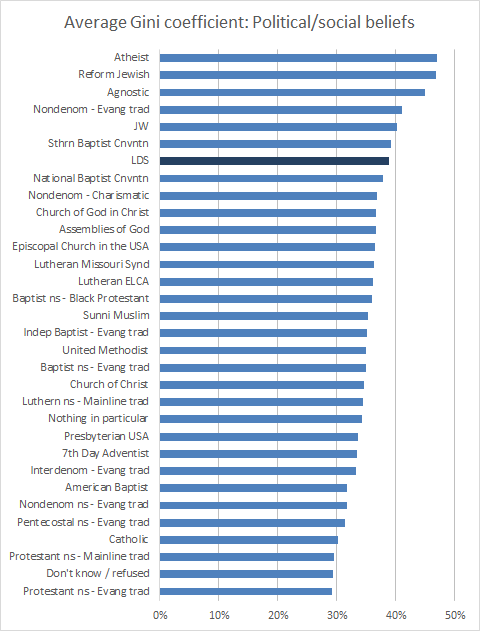
Mormons are high, but far from the highest. What’s most interesting to me here is that agnostics and atheists take two of the top three spots. That they score as so homogeneous compared to religious denominations suggests maybe that self-identifying as an agnostic or an atheist versus as “nothing in particular” or “don’t know,” which both fall much further down on the list, is more of a political than a religious statement.
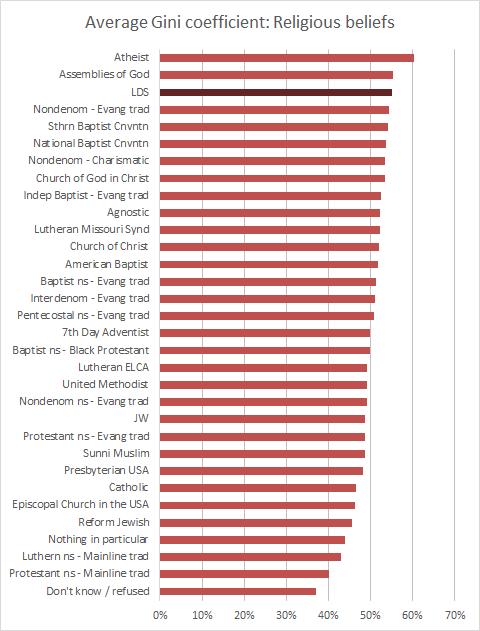 Mormons score much higher in homogeneity on religious belief.
Mormons score much higher in homogeneity on religious belief.
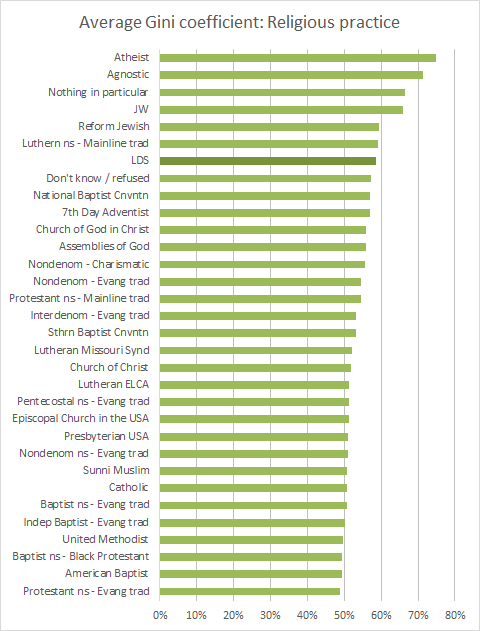 Going against my expectations, Mormons score lower relatively on homogeneity in religious practice than on belief, although we’re still pretty high. Note that this difference is quite small in terms of the size of the average Gini coefficient as opposed to the rank. The x-axis length changes from graph to graph.
Going against my expectations, Mormons score lower relatively on homogeneity in religious practice than on belief, although we’re still pretty high. Note that this difference is quite small in terms of the size of the average Gini coefficient as opposed to the rank. The x-axis length changes from graph to graph.
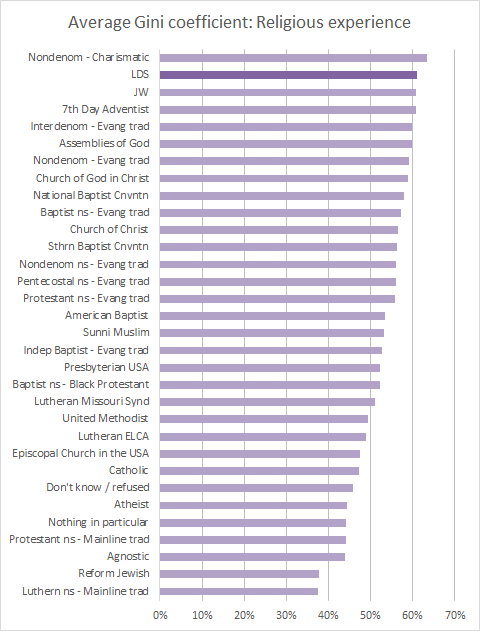 Compared to other denominations, Mormons score higher on religious experience homogeneity than for any of the other question subsets. I haven’t done any statistical tests, but I doubt any of the differences by question subsets represents more than random error. In any case, that Mormons generally score high across all four subsets does seem consistent with my prediction that Mormons would be among the more homogeneous of denominations.
Compared to other denominations, Mormons score higher on religious experience homogeneity than for any of the other question subsets. I haven’t done any statistical tests, but I doubt any of the differences by question subsets represents more than random error. In any case, that Mormons generally score high across all four subsets does seem consistent with my prediction that Mormons would be among the more homogeneous of denominations.
I also find it interesting to see that agnostics and atheists, who score as so homogeneous in political/social beliefs, religious beliefs, and religious practice, score near the bottom when it comes to religious experience. Again, this is a measure of homogeneity, so this indicates that agnostics and atheists have the most variety in religious experience, while members of denominations tend to have more similar experiences to their co-religionists.
I’m going to list all the questions that I included in each of the subsets above, but while I did, I thought it would also be interesting to show the results for each question. You can estimate the size of the Gini coefficient for each question for a denomination by looking at the sizes of its bars. If they’re pretty similar in size, the Gini coefficient is low. If there’s a single big bar and the others are small, then it’s high.
A few notes about the graphs:
- Rather than show all 32 denominations, which would be too much even for me, I chose just five groups to compare Mormons against: a couple of other out-of-the-mainstream Christian denominations (Jehovah’s Witnesses and Seventh Day Adventists), two of the largest Protestant denominations (Southern Baptists and United Methodists), Catholics, and agnostics. Some of the questions, particularly about religious practice, were not asked of agnostics, so I’ve excluded them from the graphs for those questions.
- I’ve combined some of the infrequently-used response categories for some of the questions. For example, the questions that ask about frequency of church attendance and prayer include both “seldom” and “never” as response categories. Because these were used so rarely, I combined them. The results presented on the Pew website often adopts this strategy as well.
- I’ve modified the wording of most of the questions to get them to fit into a graph title. For the full questions, see this PDF of the entire questionnaire.
- You’ll notice that I’ve used different sets of colors in the graphs. I’ve tried to show differences of amount (e.g., of attendance) with varying shades of the same color, and differences of kind with different colors. I’ve always used gray for the “don’t know/refused” response category.
- They’re unrelated to the main point of this post, but I couldn’t help but make a few observations about the patterns of responses for some of the questions.
Political/social beliefs
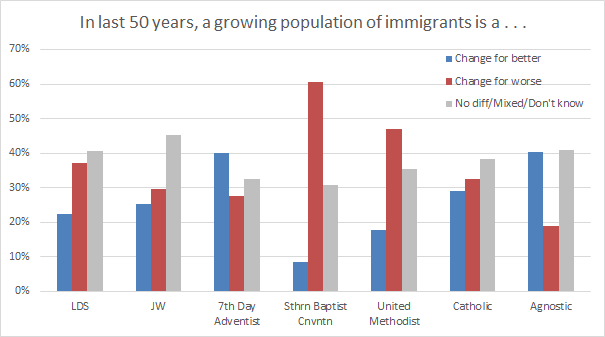 Southern Baptists really don’t like immigrants. It’s no surprise that they like Donald Trump so much.
Southern Baptists really don’t like immigrants. It’s no surprise that they like Donald Trump so much.
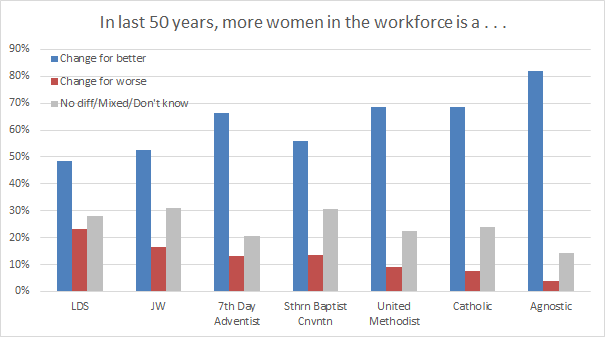 I’m honestly (pleasantly!) surprised that even members of more conservative religions see this as a positive, and by such a wide margin. I would guess that many GAs, President Nelson chief among them, do not.
I’m honestly (pleasantly!) surprised that even members of more conservative religions see this as a positive, and by such a wide margin. I would guess that many GAs, President Nelson chief among them, do not.
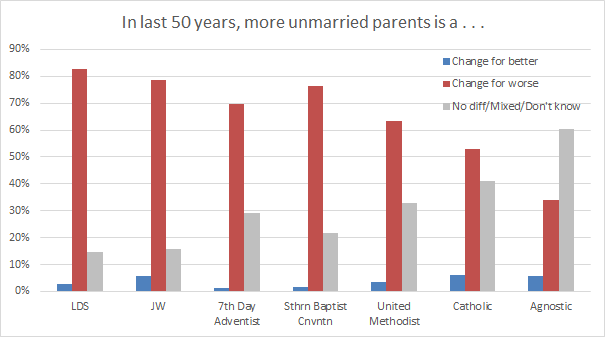
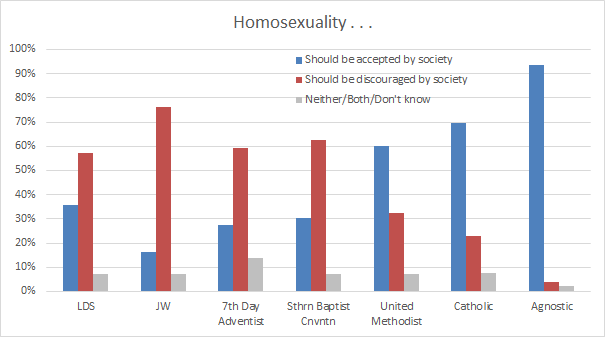
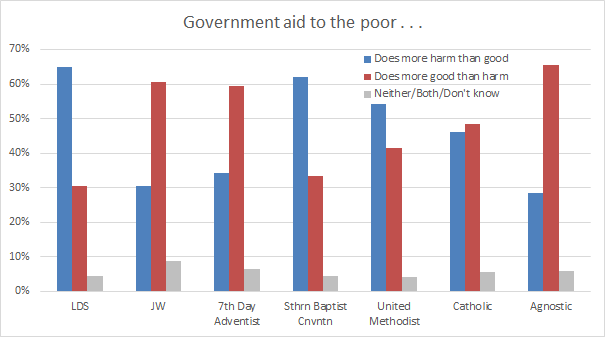
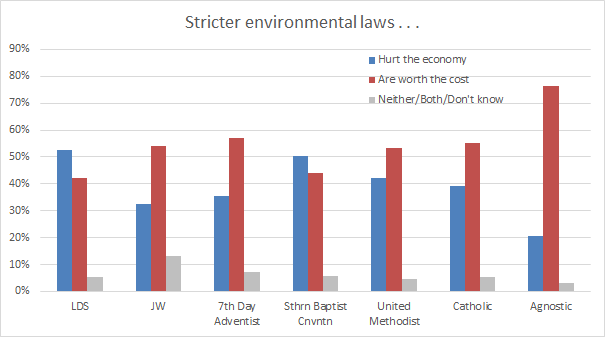
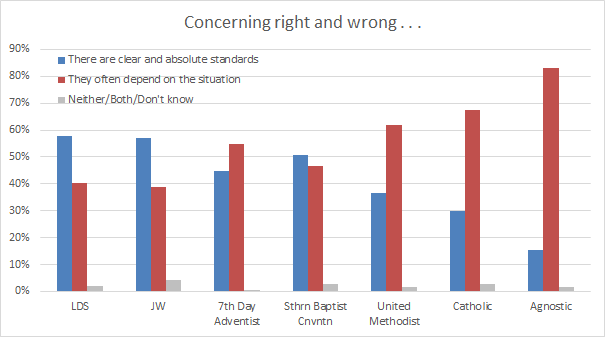
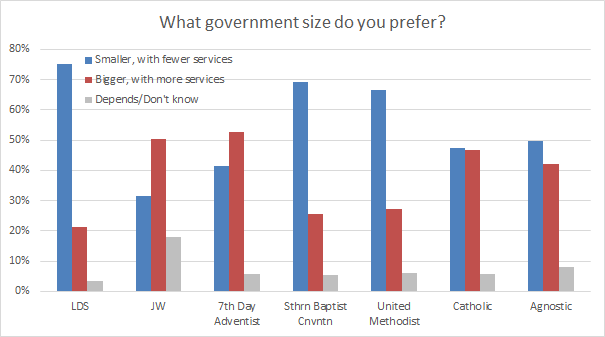
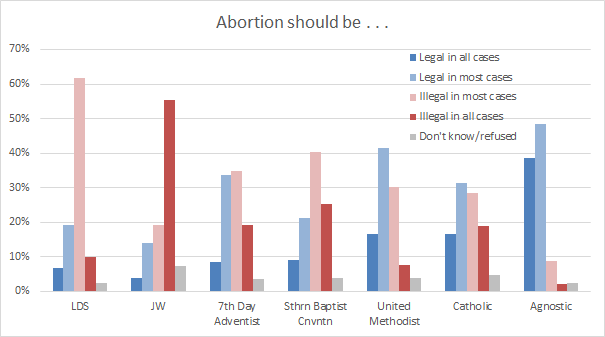 I think it’s interesting that the Jehovah’s Witnesses, who deliberately stand away from politics, do such a good job of defying typical US political categorization. They’re strongly in favor of government welfare for the poor (see a few questions up) but also strongly opposed to abortion.
I think it’s interesting that the Jehovah’s Witnesses, who deliberately stand away from politics, do such a good job of defying typical US political categorization. They’re strongly in favor of government welfare for the poor (see a few questions up) but also strongly opposed to abortion.
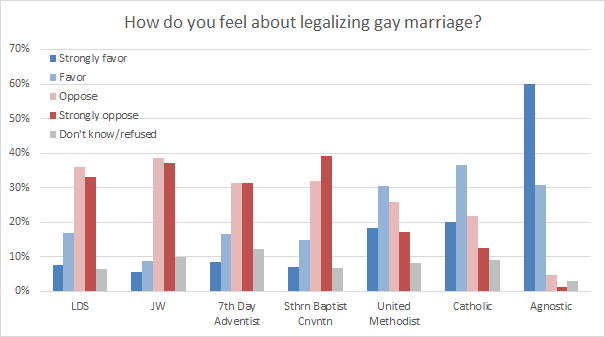 Recall that this survey was done before gay marriage was legal.
Recall that this survey was done before gay marriage was legal.
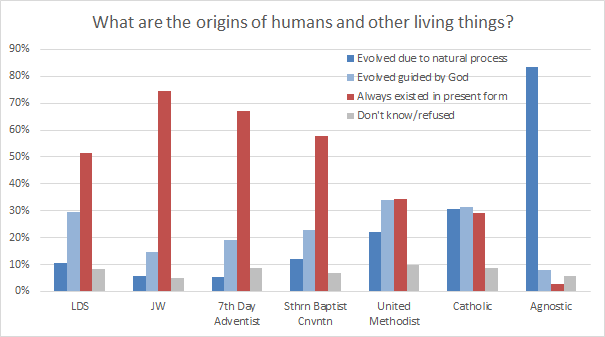
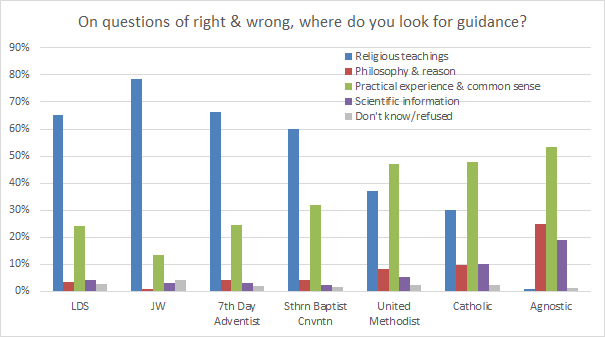
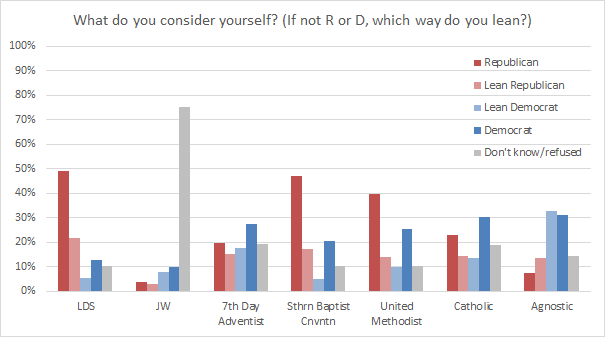
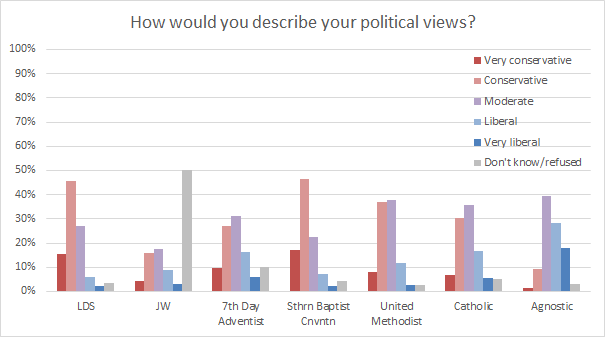
Religious beliefs
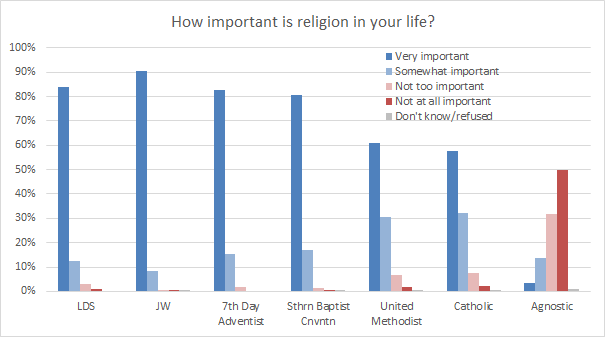
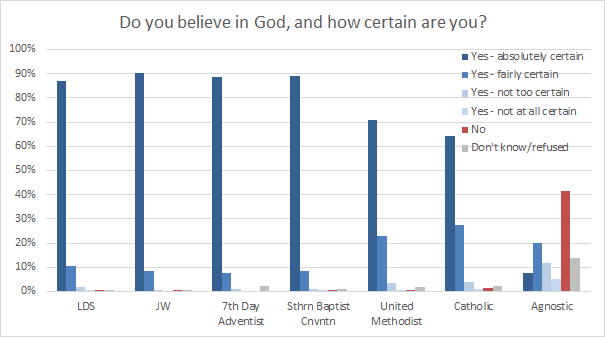
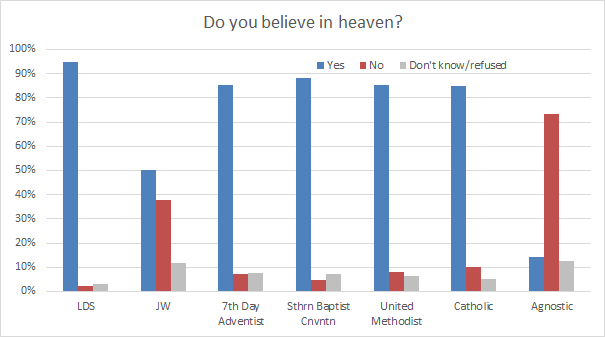
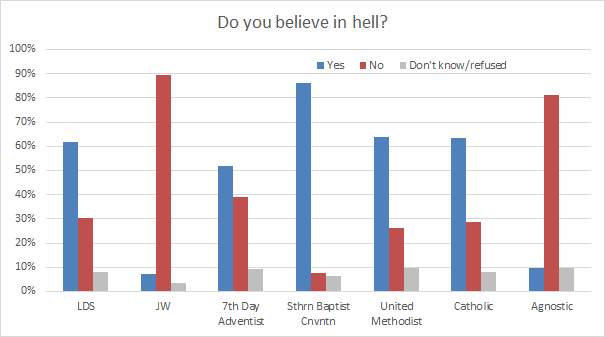 Jehovah’s Witnesses are way out of line with other Christians on both the heaven and hell questions. I don’t know a ton about them, but I would guess that their members who responded to this questionnaire were frustrated that they couldn’t elaborate and explain that their beliefs might not fit neatly into the heaven/hell duality.
Jehovah’s Witnesses are way out of line with other Christians on both the heaven and hell questions. I don’t know a ton about them, but I would guess that their members who responded to this questionnaire were frustrated that they couldn’t elaborate and explain that their beliefs might not fit neatly into the heaven/hell duality.
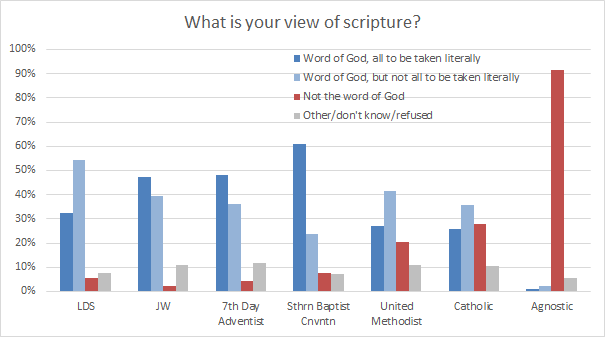 The questionnaire asked specifically about the Bible when respondents indicated that they were Christian, rather than about scripture in general, which might account for the majority of Mormons responding with “not all to be taken literally.”
The questionnaire asked specifically about the Bible when respondents indicated that they were Christian, rather than about scripture in general, which might account for the majority of Mormons responding with “not all to be taken literally.”
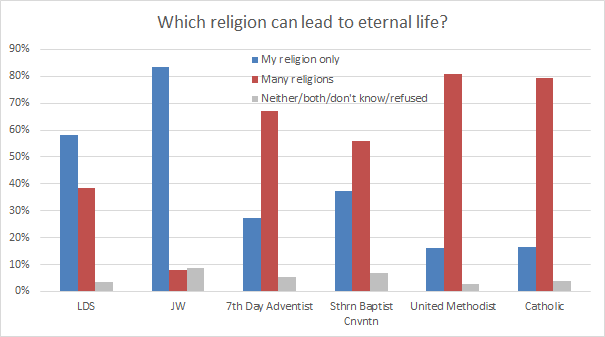
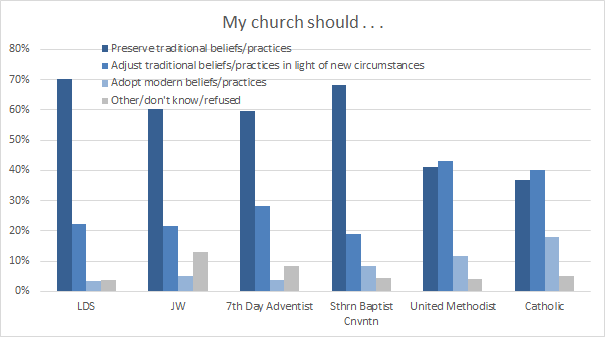
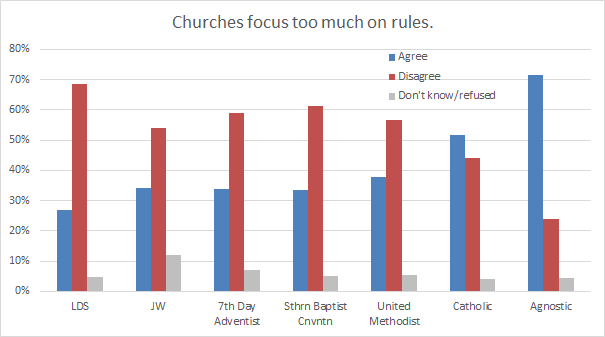 Ha! No surprise here, I guess. Mormons love our rules. Of course churches aren’t focused too much on rules. How could such a thing even be possible?
Ha! No surprise here, I guess. Mormons love our rules. Of course churches aren’t focused too much on rules. How could such a thing even be possible?
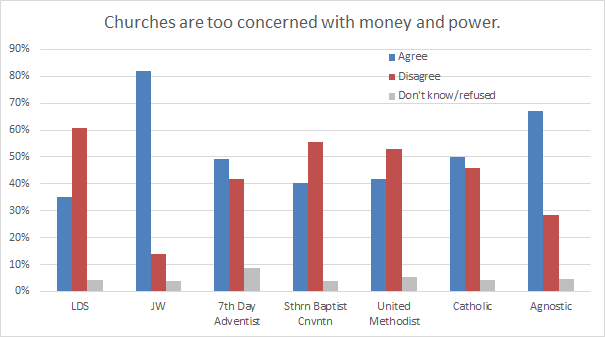
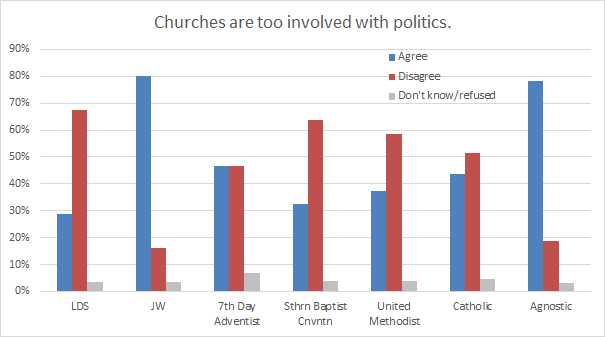 I find the Jehovah’s Witnesses’ responses interesting here. I have to wonder if most Christians hear “churches” and think “my church,” while Jehovah’s Witnesses hear “churches” and think “other churches.”
I find the Jehovah’s Witnesses’ responses interesting here. I have to wonder if most Christians hear “churches” and think “my church,” while Jehovah’s Witnesses hear “churches” and think “other churches.”
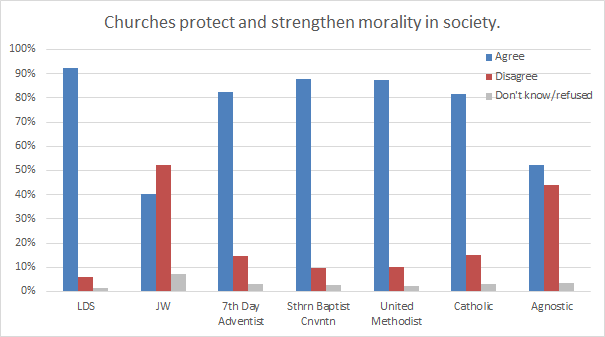
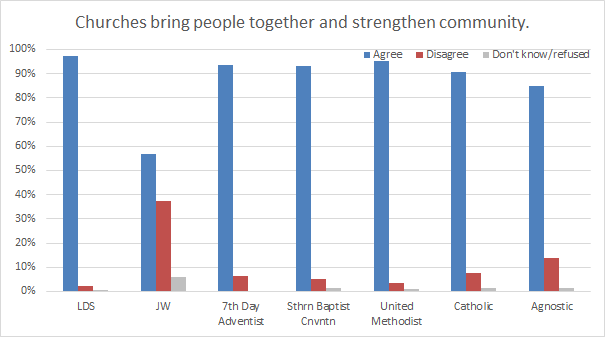
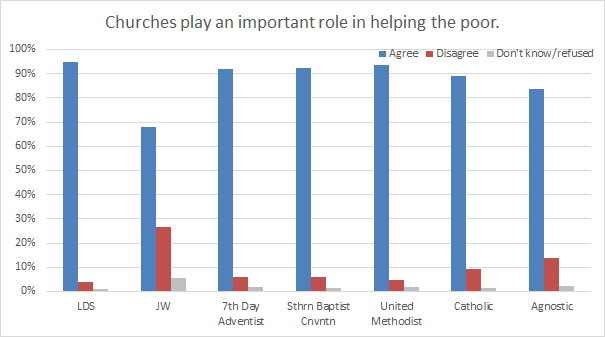
Religious practice
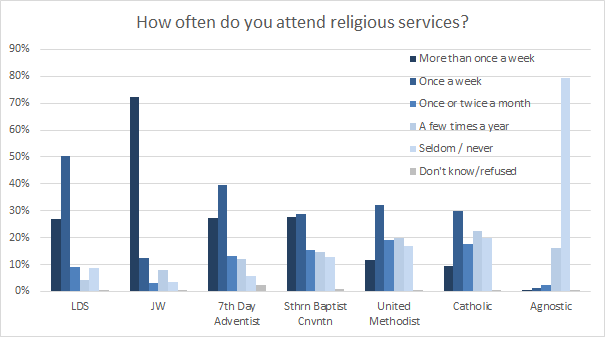
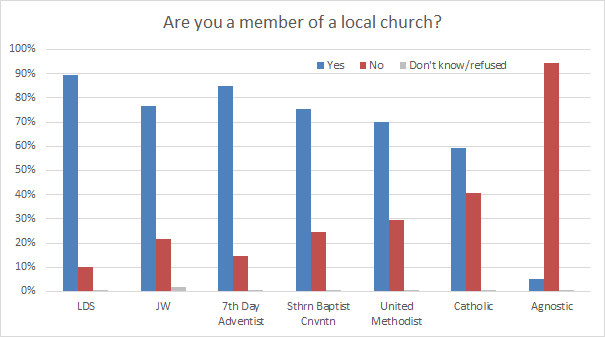
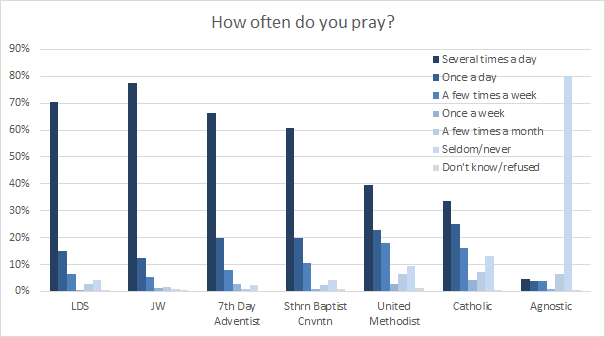
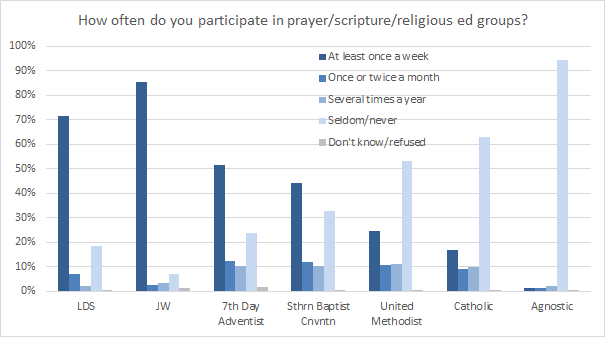
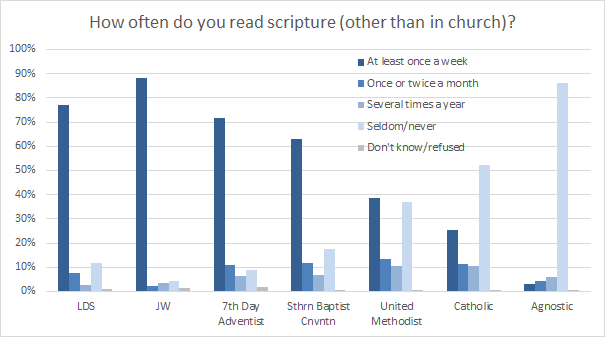 Wow. Catholics follow the stereotype: The majority response is to read scriptures seldom or never.
Wow. Catholics follow the stereotype: The majority response is to read scriptures seldom or never.
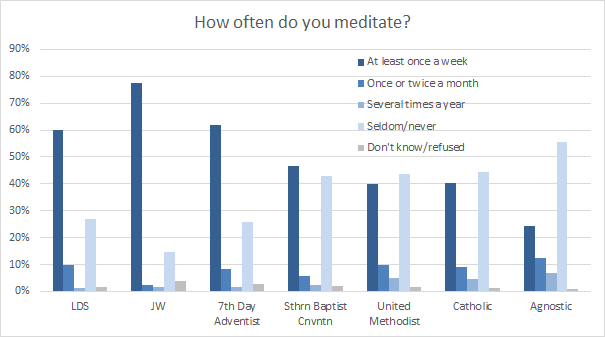
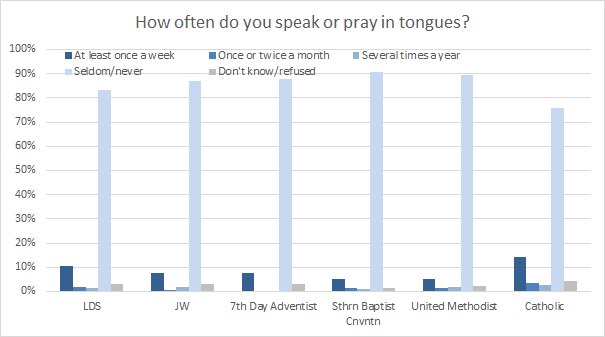
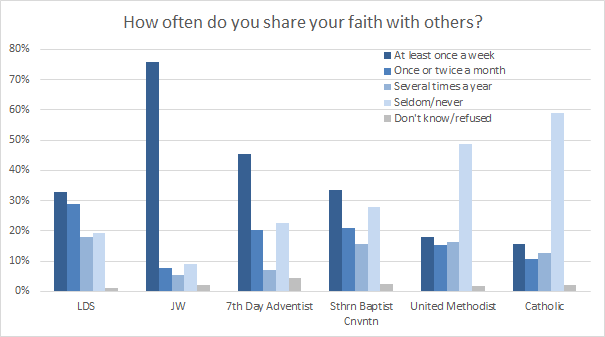
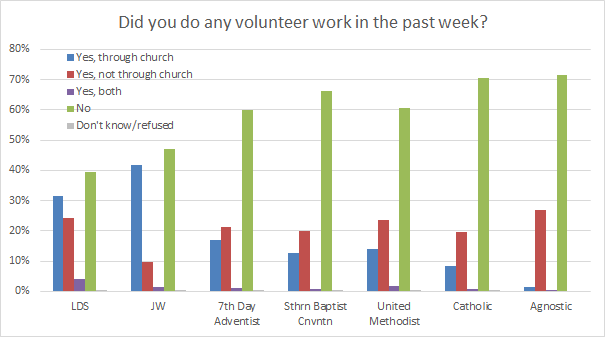
Religious experience
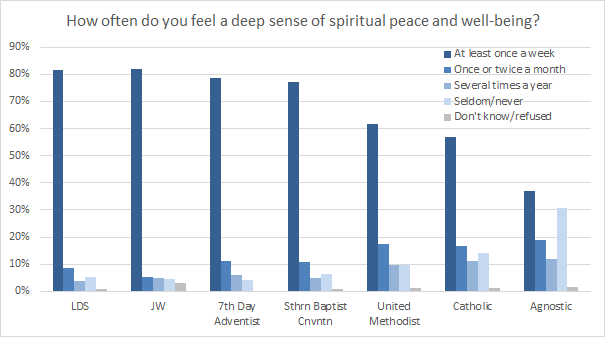
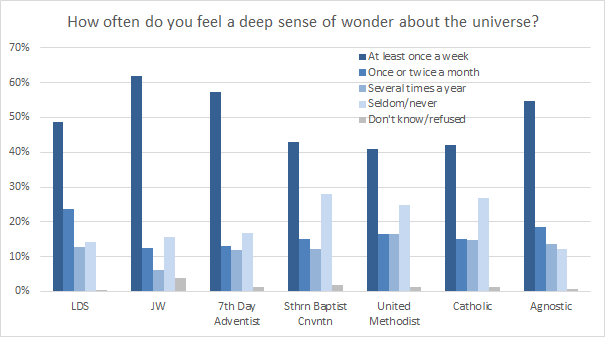
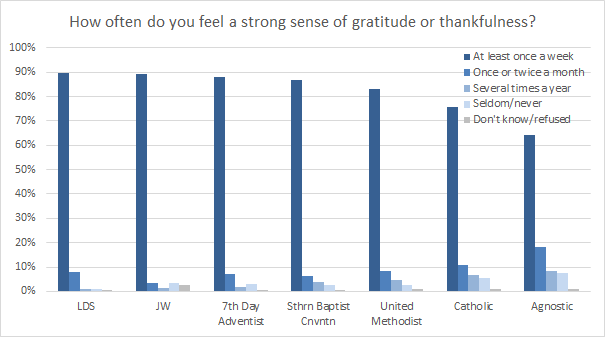
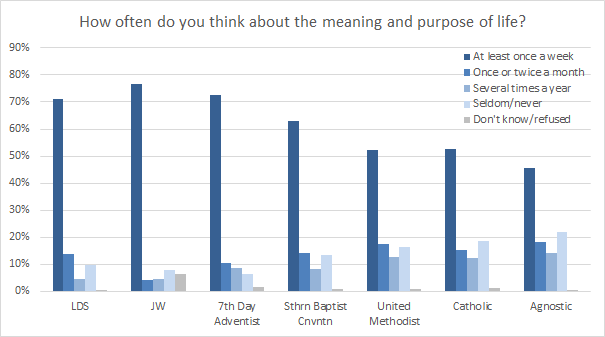
This is amazing, Ziff, as always! Very interesting, but what 10% of Mormons are speaking in tongues on a weekly basis?? I seriously missed out on that in my wards…
I think I was most surprised by how many believed that other religions can lead to eternal life across the Christian religions. Do you think they interpreted that as other denominations?
Great questions, Enna. I wondered the same thing about speaking in tongues. This is obviously a total guess, but I wonder whether, given that the gift of tongues is so often talked about in Mormonism as the gift of speaking a new language so you can do better missionary work, people were thinking of something other than what Pentecostals, for example, would think of as the gift of tongues.
On your second question, I do think it’s largely Christians thinking whether or not other Christians can be saved. There’s a follow-up question that I didn’t look at that probed into whether respondents who thought that other religions might lead to salvation as well as their own were thinking only of other Christian religions, or of religions more broadly.
First, fascinating. Thank you for doing this analysis and sharing.
Second, I am not an expert on Jehovah’s Witnesses. However, I remember a very specific conversation that occurred out in our driveway when we stopped our basketball game to talk with some Jehovah’s Witnesses who stopped by. My oldest brother and I were teenagers, at the time. From my understanding and my recollection of that understanding, 244,000 of all the world’s population throughout time are resurrected into some sort of glory. The rest simply cease to exist. So, if I have it correct, that would explain the heaven and hell answers.
When I saw the categories that you were going to use, I was sure that the atheists would be the most homogeneous politically, certainly more than the fairly homogeneous LDS. There are a couple surprises to me, like the general disfavor of immigrants by the United Methodists.
One result that Ziff commented on that I would have guessed is the belief by JWs in the corruption of religion. That is a major theme in their literature that I have seen.
Also, I note that LDS is the only religious group in the detailed groups that has a majority who believe the bible is the word of God, but not all to be taken literally. I have seen many complaints in the LDS blogs about members only wanting to discuss literal interpretations of scripture in Gospel Doctrine class. Maybe the complainers should try a slightly different approach. In some ways, they are in the majority.
70% of Mormons reject modern revelation!?
You mentioned “self-identifying as an agnostic or an atheist versus as “nothing in particular” or “don’t know,” which both fall much further down on the list, is more of a political than a religious statement.”
Another interpretation is that rejecting a belief in God (atheist) or believing that God’s existence is unknowable and irrelevant (agnostic) leads a person to hold specific political views. After I left the LDS Church a few years ago and became an atheist, my political views changed quite a bit–they became much more focused on preventing suffering (such as allowing for assisted suicide), protecting the environment (the Earth is not going to be burned, but we have to live with whatever we do to it), and doing stuff now to help people have better lives, rather than banking on a better future in heaven, loyalty to some authority figure, or purity.
Perhaps those who label themselves as “nothing in particular” or “don’t know” are still deists, and so don’t necessarily hold the political views that logically follow from not believing in the Judeo-Christian God.
Wow, I am really excited to see how this data changes in the next few years. (Hopefully Pew will do another study next year or so?)
A small correction to my comment: The number should be 144,000. This is what happens when I comment late at night.
Note that the Pew data includes not just Mormons but restorationist breakoffs in their data. While that explains some of the oddities there’s still some real head scratchers.
Kindra, right, that matches what I know of the Jehovah’s Witnesses. I think heaven is, like you said, only for the 144,000, but also that other people who are good but don’t make it to that top group get to live forever on a paradise earth (I think that’s the title of some of their pamphlets I’ve seen). So it’s definitely more complicated than the usual Christian view.
el oso, that’s an interesting point about the corruption of churches. I didn’t realize that was a theme they hit on a lot. It certainly makes sense, though.
Left Field, ha! That’s a good take on that one question. I assume respondents were thinking of the importance of the Church resisting outside influences that might change traditional ways.
Anonymous, your interpretation makes a lot of sense. I kind of lean agnostic myself, although I’m also still a participating Mormon, and what you said about focusing on this life versus the next really rings true for me too. Certainly on issues like environmentalism, I’m really disappointed that so many religious people seem happy to throw up their hands and say “Jesus will fix it all,” as an excuse for not worrying about any damage we humans are causing.
Michelle, I agree! I always enjoy the stuff they produce, and I’d love it if they did another round. I think it was seven years in between surveys last time, so it might be a few years still.
Clark, thanks for the info. I saw that in the Pew data, which is actually why I chose to drill down all the way to denomination level for my analyses, which means I was including only Latter-day Saints (and not members of other churches based on Joseph Smith’s restoration) in the category I label as LDS.
Tom, Somehow I overlooked this question. Nicolas is correct, everyone believes something about Jesus. The Jesus of Mormonism is a different Jesus from classical Christianity. They believe there are literally billions of gods. All Mormons can become a god. Jesus was another god. Mormonism rejects the doctrine of the Trinity. The Bible clearly teaches there is only 1 God. The Trinity teaches one God subsists in 3 persons Father, Son, and Holy Spirit; co-equal and co-eternal. This is an essential doctrine of the Christian faith. If you reject the Biblical Jesus (as I have shown in my post) then you cannot be a classical or shall we say a historical Christian. Part 9 goes into more detail and gives additional reasons why Mormons are not Christians. Steve